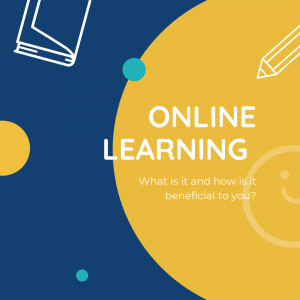What Is Online Learning and How is it Beneficial to you?
What is online learning? What are the benefits?
Online learning is more prevalent now than ever due to COVID restrictions. Many students are turning to this alternative way of learning, whether it be because of the ongoing effects of the virus, they are working full-time or just want the convenience of studying from home. Research shows that one in four students participate in online learning today.
Due to rapid changes in technology, students are finding it increasingly easy to study from home. According to THIS article, “Advances in technology now allow students to study entirely online while still socializing with classmates, watching lectures and participating in subject-specific discussions.” Students can virtually feel that they are in a classroom.
Here are some interesting facts about online learning:
- More than 6 million students are currently in online courses as part of their higher education program
- Almost half of all students enrolled in online courses are educated exclusively through distance education
- 85% of students think that online learning is the same or better than the traditional classroom experience
[Statistics taken from Purdue University & The National Center for Education Statistics]
What resources are used?
From ebooks, ejournals, recorded lectures, discussion forums and other technology, online learning has evolved quite a bit since its inception.
Like many online programs, at UNG, one is officially registered as a student and has access to the same resources as an on-campus student, from registering for classes via Banner to using our online learning management system, Desire 2 Learn (D2L), through which students take classes. An online degree is similar to taking a degree program on campus but you have the freedom to direct your own study schedule.
How are students assessed?
Students taking a degree program or an individual course online will still be tested at regular intervals throughout their study period to assess their understanding of the course materials.
There are many ways to assess students taking online courses, from individual assignments to discussion boards. Of course, exams are still prevalent and you can expect to take them as well.
How is cheating prevented?
Online learning doesn’t mean easier learning! Online institutions adhere to the same standards of excellence as brick-and-mortar institutions. As online learning technology has developed, virtual institutions have perfected digital processes to prevent cheating and/or plagiarism.
Course instructors work hard to ensure that cheating is almost impossible in an online course. For example, as many universities do, UNG uses an advanced plagiarism detection software. In most cases, major written assignments will be uploaded to turnitin.com. The process is simple and ensures that the work submitted by students is in fact their own work. All submissions you make for your online course, from assignments to exams, will be scrutinized electronically and will also be subject to additional checks by your instructor.
How to stay in touch with your professor?
Even with online courses, it is possible to stay in touch with your professor throughout the class. They are just an email away if you have any questions or concerns. They often are still on campus as well, so you can schedule socially distanced meetings as needed.
The Political Science & International Affairs (PSIA) Department at UNG offers several different online options. For the very first time, the PSIA Department is offering an undergraduate degree in Political Science. The department also offers two graduate programs online, a Master of Arts in International Affairs (MAIA) and a Master of Public Administration (MPA).



